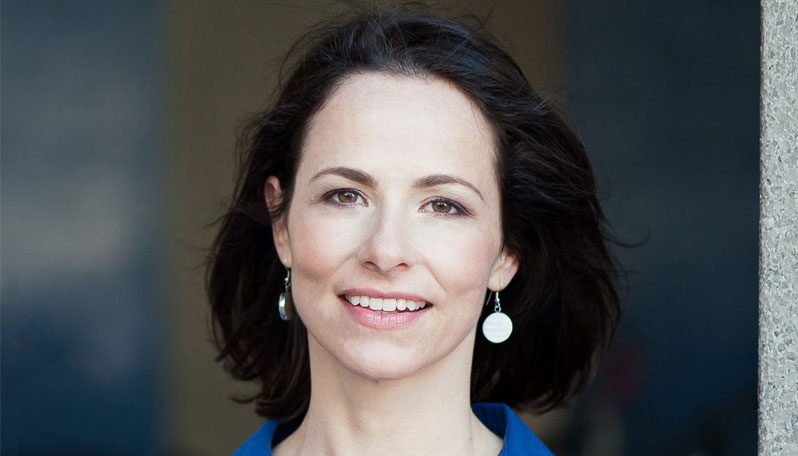Tess Posner inspires and trains diverse AI talent
Tess Posner is the CEO of AI4ALL, a nonprofit dedicated to increasing diversity and inclusion in artificial intelligence. AI4ALL offers AI education and mentorship programs to increase AI access, exposure, and career opportunities for underrepresented populations.
Tess holds a master's degree from Columbia University in social enterprise administration and a bachelor’s degree from St. John’s College. She has dedicated her career to cultivating talent. Previously, Tess managed programs in New York City’s Impact Coalition that taught competitive debate as a literacy and empowerment tool in underserved public schools. She then ran education and employment programs at First Place for Youth, a non-profit addressing the lack of affordable housing and resources for former foster kids, and then proceeded to become managing director of Samaschool, a non-profit focused on preparing low-income people to succeed in the digital economy. Before joining AI4ALL, Tess served as the managing director of TechHire (part of Opportunity@Work), an initiative launched by the White House to help underrepresented Americans start careers in the technology industry in more than seventy urban and rural communities.
We met up with Tess to learn how she applies her background to her work, and asked her some questions from the PAIR Questionnaire: a set of discussion prompts compiled by Google’s People + AI Research (PAIR) team to understand how worldwide thought leaders would make relationships between people and AI more productive, engaging, and fair. (All opinions are those of Tess Posner.)
What key experience most shaped your career and life focus?
I grew up near Boston, Massachusetts, and when I was in high school, I traveled to El Salvador to build houses with Habitat for Humanity. It was a relief effort after a pretty devastating earthquake. I was deeply moved by the lack of opportunity available to the families whose homes we were rebuilding.
I realized that simply because you were born in a different zip code, you might not have access to clean water, or education, or healthcare. It seemed deeply unfair.
Having that experience as a young person opened up my world view. My experiences since then have proven that talent and potential are equally distributed, but opportunity is not. From that point on, I have been passionate about creating impactful and scalable initiatives to give people everywhere the opportunity to live up to their full potential and thrive in today's world.
How might we make it easier for more people to build machine learning systems?
AI is more accessible than people think. The general perception is that machine learning and AI are very exclusive and to work with them you need an advanced degree. However, at AI4ALL, we run education programs for high school students that enable them to start working on machine learning and AI projects after just a few weeks of skill building.
Recently, I attended the first graduation of one of our new education programs with Simon Fraser University in Canada. Within a couple of weeks at our summer camp, high school students were able to build amazing projects. I watched our students present final projects that included everything from using AI to detect fake news to using AI to better predict the path of the flu.
I think we are dispelling the myths that AI is exclusive, or that you need an advanced degree to get started with AI or machine learning.
How can AI aid and augment professionals in their jobs?
We see a lot of narrative about humans being replaced by AI, but I feel that we can be designing AI that complements humans and focuses on increasing positive outcomes and opportunities for people.
AI can amplify a person’s existing capabilities by tapping into large amounts of real-time data that a human could not process. AI can help us make better and more timely decisions.
One example is the mechanical design software Autodesk’s Project Dreamcatcher. The Dreamcatcher AI iterates through a range of possible designs to help the human designer produce something more innovative. The task of creating a number of iterations is given to the machine, while the creative work remains with the human.
Another example is customer service, where some repetitive queries are handled by a machine, and humans are reserved for problem solving and driving a better customer experience.
I also think AI has a lot of promise in education. Teachers are overwhelmed with large classroom sizes, and AI can assist teachers with some of the more rote parts of their job, as well as developing more personalized adaptive learning curriculums. This frees up teachers to spend more one-on-one time with students.
AI may have a disruptive impact on some industries, and we have to be proactive in supporting people who might be impacted through fast-track job training and support systems. AI technology is a tool that we have the power to direct, and we should approach it that way rather than through fear. Rather than thinking of AI in an adversarial way, we can focus on applying AI tools to augment and amplify our existing capabilities to assist us in our goals.
How might we ensure inclusion so that everyone can benefit from breakthroughs in AI?
Inclusion is important because AI is clearly going to shape, change and potentially disrupt many industries. From an ethics and responsibility standpoint, diversity and inclusion are critical to mitigate potential risks such as algorithm bias.
There is currently a talent crisis in AI. There are not enough people, and there are not enough diverse people, with the skills to meet the demand. We certainly do not want to miss out on untapped pools of talent.
Diversity and inclusion will lead to AI addressing more diverse problems. A recent study showed that if we include more women, minorities, and low income indivduals in the innovation economy, the rate of innovation in America could quadruple. If we are more inclusive about who is building and shaping these technologies, we will end up with more innovative and creative projects and products.
Of course, inclusion is good for business. Many studies show that diverse teams and companies perform better by many measures - such as better financial returns. A recent Intel study showed that if we increase diversity in the tech sector alone it could add $500 billion in new value to the economy per year. So, there are many reasons why inclusion and diversity are really important.
In order to increase diversity and inclusion, we need to start early. Underrepresented populations get discouraged from going into STEM fields at an early age. This is why AI4ALL is focused on engaging with students in high school.
We see amazing success after people graduate from our programs. Many of our former students are working on AI-for-good projects. For example, one of our graduates, who was still in high school, won the best paper award for her research improving surgeon technique using machine learning at last year’s Conference and Workshop on Neural Information Processing Systems (one of the world’s largest AI conferences).
That is just one of many examples. We also have another student who is working to address water quality issues using AI. She grew up the daughter of farm workers, and this is an issue that directly affects her family’s community.
Many of our students start AI education initiatives because they see the power of this incredible tool and they want to share it with their peers and their communities. On average, each student that AI4ALL educates goes on to educate an average of fourteen more, which is an amazing network affect.
If we include more people from all backgrounds, especially at early ages, in AI, they will be using this technology to solve problems relevant to them and may be the ones to find some potential moon shots!
How can people get involved with AI4ALL?
We connect our students with mentors and role models, so if you are a professional in the AI field, either in a research organization or a private company, we would love you to get involved in shaping the next generation of AI leaders.
If you are a university or high school, you can partner in our AI education program.
You can participate if you are a community member. AI4ALL is very much a communal effort, and our ecosystem of partners and supporters is critical. We work with community partners and local organizations to help recruit students for education programs.
We are partnering with many AI-focused companies to connect our students with opportunities. AI4ALL can be an incredible source of diverse talent for AI teams.
We graduate amazing people who are incredibly talented and passionate.
Please get in touch. We want to work with you!
Contact Us
Stay in touch. We want to hear from you. Email us at Acceleratewithgoogle@google.com
Please note that this site and email address is not affiliated with any former Google program named Accelerator.



